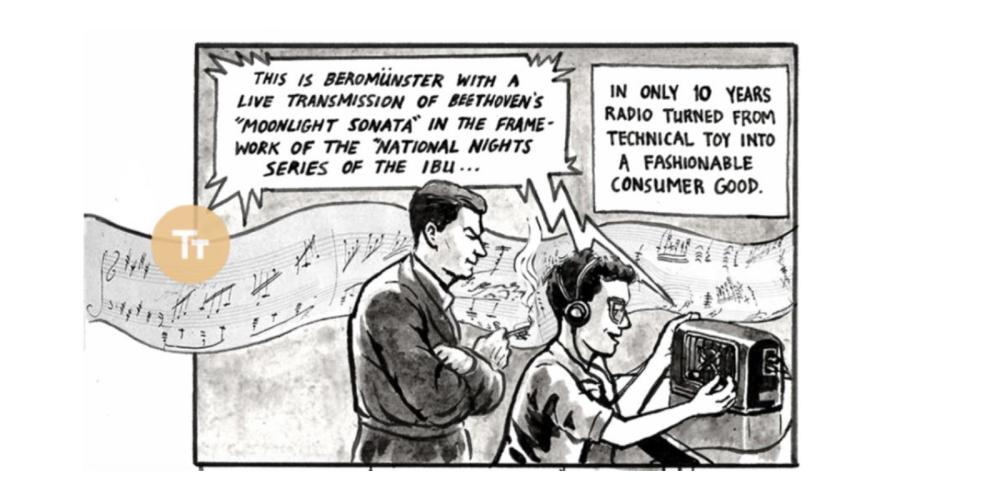
Hoe een digitale strip onze kijk op Europese geschiedenis op z’n kop zet
Het VUB Centre for Literary and Intermedial Crossings (CLIC), gespecialiseerd in intermediale vertelvormen, verwelkomt momenteel professor Andreas Fickers, expert in publieksgeschiedenis. Samen met het Belgisch Stripcentrum organiseerde CLIC de inaugurele lezing van de VUB Lorand Leerstoel Intermedialiteit tijdens de VUB/ULB We.Konekt.Week. Fickers werkt aan de digitale stripreeks Making Europe, die een radicale draai geeft aan hoe we geschiedenis verbeelden.
Geschiedenis in stripvorm
Geschiedenis en strips zijn een goed duo – denk maar aan Asterix. Toch zijn er maar weinig onderzoekers die strips gebruiken om hun wetenschappelijke inzichten te delen. Nochtans is de strip een uitstekende vorm om complexe historische processen toegankelijk te maken: visueel sterk, breed aanspreekbaar.
De voorbije tien jaar werkte professor Fickers met een internationaal team van wetenschappers aan de Making Europe-boekenreeks, die Europese geschiedenis benadert vanuit technologie. De zes delen dagen het klassieke verhaal van Europese integratie uit door technologie centraal te stellen als motor van verandering. Maar daar bleef het niet bij: het team transformeerde de boeken ook tot digitale strips.
Comics worden digitaal
De digitale strip – een mix van tekst en beeld – is het ideale medium om geschiedenis te duiden: klikbare icoontjes leiden naar extra informatie en audiovisueel materiaal dat de context verduidelijkt. “In plaats van alles te googelen, klik je gewoon op een icoon om de historische info te bekijken,” zegt Femke Van Der Smissen, student in het VUB Honoursprogramma.
“Via ‘scrollytelling’ word je meegezogen in een nieuwe digitale leeservaring,” vult professor Literatuurwetenschap Birgit Van Puymbroeck aan. “Je scrolt door het verhaal, en klikt op de icoontjes die je naar specifieke bronnen leiden. Je verdiept je in het verhaal, zonder te verdwalen in een doolhof van hyperlinks.”
De digitale stripreeks nodigt lezers uit om op een nieuwe manier met geschiedenis om te gaan: door de combinatie van tekst en beeld, en de gelaagdheid aan betekenissen en bronnen, ontstaat een rijke, meerdimensionale leeservaring. De Making Europe digitale stripreeks zal binnenkort gratis online beschikbaar zijn.
Archetypes
De inhoud van de digitale strip is gebaseerd op het boek Communicating Europe: Technologies, Information, Events van Andreas Fickers en Pascal Griset, maar zoomt in op één aspect: de koloniale dimensie van de omroeptechnologie. De strip werkt met archetypes – de ‘technocraat’, de ‘uitvinder’ en de ‘techno-diplomaat’ – om dit verhaal te verbeelden.
“Archetypes zijn soortpersonages die een bepaalde rol vervullen,” legt professor Literatuurwetenschap Alison Luyten uit. “In sprookjes heb je de held, de heks… Hier gaat het over de vele vrouwen en mannen die mee vormgaven aan technologie.”
De strip volgt het personage Brouillard, een fictieve radio-ingenieur gebaseerd op de historische figuur Raymond Braillard. Die ontwierp een draadloze telegraaf voor Belgisch-Congo en werd later hoofd van het Technisch Comité van de Internationale Radio-unie (IBU), gevestigd in Brussel.
Andreas Fickers is professor hedendaagse en digitale geschiedenis en directeur van het Luxembourg Centre for Contemporary and Digital History aan de Universiteit van Luxemburg. Hij bekleedt momenteel de Lorand Leerstoel Intermedialiteit aan het Centre for Literary and Intermedial Crossings (CLIC) aan de VUB, gefinancierd via de Lorand-legaat. Zijn inaugurele lezing “Unflattening European History through Transmedia Storytelling: The Making Europe Digital Comics Series” vond plaats in het Belgisch Stripcentrum, in het kader van de VUB/ULB weKonekt.Week.
De Making Europe digitale strip is een samenwerking tussen Shintaro Miyazaki (illustraties), Lizzie Kaye (productiemanager), Jessica Burton (scenario) en Helmuth Trischler (co-editor van de reeks, samen met Andreas Fickers). De strip zal binnenkort beschikbaar zijn op het online platform van de Making Europe-reeks (www.makingeurope.eu), waar je ook een blog, podcast en andere multimediale formats vindt.